Problem
Example for setting up monitoring for Docker environment using ELK and Prometheus-Grafana.
Goal:
-
Build logging monitoring system using ELK stack to monitor logs from Docker containers automatically.
-
Build metrics monitoring system using Prometheus and Grafana to monitor Docker containers and linux host automatically.
-
Build alerting system using Prometheus Alertmanager to send alerts via AWS SES email
-
Add Kong API Gateway as host entry for Cloudflare Tunnel and monitor its logs and metrics
High Level Architecture
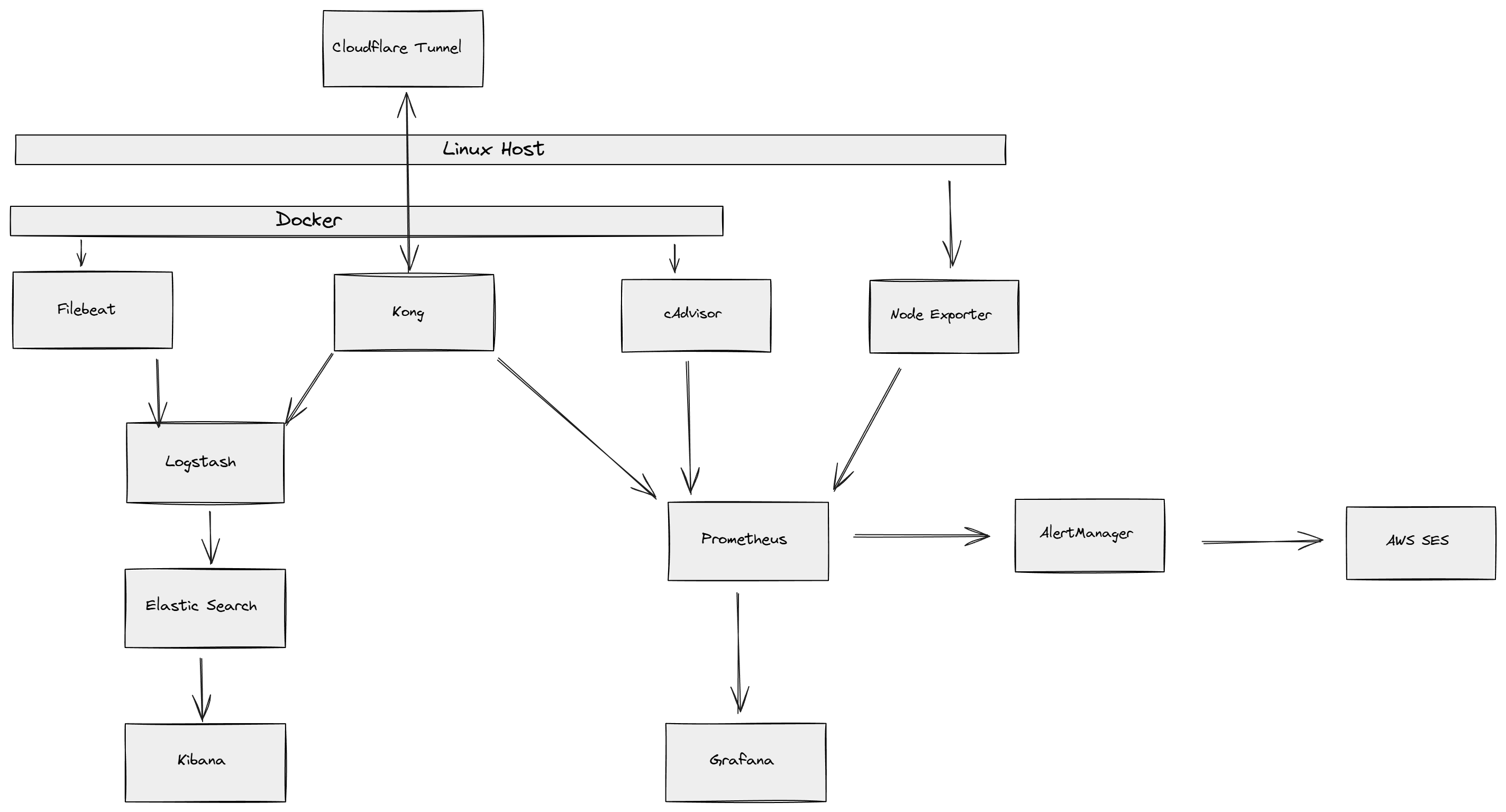
Components and ports:
-
Prometheus (9090)
-
Grafana (3000)
-
Node Exporter (9100)
-
cAdvisor (8080)
-
Elasticsearch (9200)
-
Kibana (5601)
-
Logstash (5044)
-
AlertManager (9093)
Project structure:
1
2
3
4
5
6
7
8
9
10
11
12
13
14
15
|
monitor/
├── docker-compose.yml # Docker Compose configuration
├── alertmanager/ # AlertManager configuration
│ └── config.yml
├── prometheus/ # Prometheus configuration
│ └── prometheus.yml
│ └── rules/
| └── alert.rules # Prometheus alerting rules
├── logging/ # ELK stack configuration
│ └── config/ # Filebeat and Logstash configs
│ └── filebeat.yml
│ └── logstash.conf
├── kong/ # Kong API Gateway configuration
| └── docker-compose.yml
| └── setup-logging.sh
|
Main Docker Compose Configuration
monitor/docker-compose.yml
in this file, we define the services and their configurations. We also define the volumes and networks for the services.
1
2
3
4
5
6
7
8
9
10
11
12
13
14
15
16
17
18
19
20
21
22
23
24
25
26
27
28
29
30
31
32
33
34
35
36
37
38
39
40
41
42
43
44
45
46
47
48
49
50
51
52
53
54
55
56
57
58
59
60
61
62
63
64
65
66
67
68
69
70
71
72
73
74
75
76
77
78
79
80
81
82
83
84
85
86
87
88
89
90
91
92
93
94
95
96
97
98
99
100
101
102
103
104
105
106
107
108
109
110
111
112
113
114
115
116
117
118
119
120
121
122
123
124
125
126
127
128
129
130
131
132
133
134
135
136
137
138
139
140
141
142
143
144
145
|
version: '3.8'
services:
prometheus:
image: prom/prometheus:latest
container_name: prometheus
ports:
- "9090:9090"
volumes:
- ./prometheus:/etc/prometheus
- prometheus_data:/prometheus
command:
- '--config.file=/etc/prometheus/prometheus.yml'
- '--storage.tsdb.path=/prometheus'
- '--web.console.libraries=/usr/share/prometheus/console_libraries'
- '--web.console.templates=/usr/share/prometheus/consoles'
restart: unless-stopped
alertmanager:
image: prom/alertmanager:latest
container_name: alertmanager
ports:
- "9093:9093"
volumes:
- ./alertmanager:/etc/alertmanager
command:
- '--config.file=/etc/alertmanager/config.yml'
- '--storage.path=/alertmanager'
restart: unless-stopped
grafana:
image: grafana/grafana:latest
container_name: grafana
ports:
- "3000:3000"
volumes:
- grafana_data:/var/lib/grafana
environment:
- GF_SECURITY_ADMIN_USER=admin
- GF_SECURITY_ADMIN_PASSWORD=admin
restart: unless-stopped
depends_on:
- prometheus
node-exporter:
image: prom/node-exporter:latest
container_name: node-exporter
ports:
- "9100:9100"
volumes:
- /proc:/host/proc:ro
- /sys:/host/sys:ro
- /:/rootfs:ro
command:
- '--path.procfs=/host/proc'
- '--path.sysfs=/host/sys'
- '--path.rootfs=/rootfs'
- '--collector.filesystem.mount-points-exclude=^/(sys|proc|dev|host|etc)($$|/)'
restart: unless-stopped
cadvisor:
image: gcr.io/cadvisor/cadvisor:latest
container_name: cadvisor
ports:
- "8080:8080"
volumes:
- /:/rootfs:ro
- /var/run:/var/run:ro
- /sys:/sys:ro
- /var/lib/docker/:/var/lib/docker:ro
- /dev/disk/:/dev/disk:ro
devices:
- /dev/kmsg:/dev/kmsg
restart: unless-stopped
elasticsearch:
image: docker.elastic.co/elasticsearch/elasticsearch:8.11.1
container_name: elasticsearch
environment:
- discovery.type=single-node
- ES_JAVA_OPTS=-Xms512m -Xmx512m
- xpack.security.enabled=false
ports:
- "9200:9200"
volumes:
- elasticsearch_data:/usr/share/elasticsearch/data
restart: unless-stopped
logstash:
image: docker.elastic.co/logstash/logstash:8.11.1
container_name: logstash
ports:
- "5044:5044"
- "5000:5000/tcp"
- "5000:5000/udp"
volumes:
- ./logging/config/logstash.conf:/usr/share/logstash/pipeline/logstash.conf
environment:
- LS_JAVA_OPTS=-Xms256m -Xmx256m
depends_on:
- elasticsearch
restart: unless-stopped
kibana:
image: docker.elastic.co/kibana/kibana:8.11.1
container_name: kibana
ports:
- "5601:5601"
environment:
- ELASTICSEARCH_HOSTS=http://elasticsearch:9200
depends_on:
- elasticsearch
restart: unless-stopped
filebeat:
image: docker.elastic.co/beats/filebeat:8.11.1
container_name: filebeat
user: root
volumes:
- ./logging/config/filebeat.yml:/usr/share/filebeat/filebeat.yml:ro
- /var/lib/docker/containers:/var/lib/docker/containers:ro
- /var/run/docker.sock:/var/run/docker.sock:ro
- filebeat_data:/usr/share/filebeat/data
environment:
- strict.perms=false
- ELASTIC_HOSTS=elasticsearch:9200
- KIBANA_HOSTS=kibana:5601
- LOGSTASH_HOSTS=logstash:5044
command: ["--strict.perms=false"]
depends_on:
- elasticsearch
- logstash
restart: unless-stopped
volumes:
prometheus_data:
grafana_data:
elasticsearch_data:
filebeat_data:
networks:
default:
host:
external: true
name: host
|
Logging Pipeling Configuration
monitor/logging/config/logstash.conf
in this file, we define the Logstash pipeline configuration to process logs from Docker containers and kong and send them to Elasticsearch.
1
2
3
4
5
6
7
8
9
10
11
12
13
14
15
16
17
18
19
20
21
22
23
24
25
26
27
28
29
30
31
32
33
34
35
36
37
38
39
40
41
42
43
44
45
46
47
48
49
50
51
52
53
54
55
56
57
58
59
60
|
input {
tcp {
port => 5000
codec => json
type => "kong"
}
beats {
port => 5044
type => "beats"
}
}
filter {
if [type] == "beats" {
if [container] {
if [container][labels][com.docker.compose.service] {
mutate {
add_field => {
"service.name" => "%{[container][labels][com.docker.compose.service]}"
}
}
} else {
mutate {
copy => {
"[container][name]" => "service.name"
}
}
}
}
}
if [type] == "kong" {
mutate {
add_field => {
"service.name" => "kong"
}
}
}
if [source] == "docker" {
mutate {
rename => { "[container][name]" => "service.name" }
}
}
date {
match => ["@timestamp", "ISO8601"]
target => "@timestamp"
}
}
output {
elasticsearch {
hosts => ["elasticsearch:9200"]
index => "logstash-%{+YYYY.MM.dd}"
manage_template => true
}
# For debugging
stdout { codec => rubydebug }
}
|
monitor/logging/config/filebeat.yml
in this file, we define the Filebeat configuration to collect logs from Docker containers and send them to Logstash.
1
2
3
4
5
6
7
8
9
10
11
12
13
14
15
16
17
18
19
20
21
22
23
24
25
26
27
28
29
30
31
32
33
34
35
36
37
38
|
filebeat.inputs:
- type: filestream
id: docker-logs
paths:
- /var/lib/docker/containers/*/*.log
parsers:
- container: ~
processors:
- add_docker_metadata:
host: "unix:///var/run/docker.sock"
- decode_json_fields:
fields: ["message", "log"]
target: ""
overwrite_keys: true
- drop_event:
when:
contains:
container.image.name: "docker.elastic.co/logstash/logstash"
- rename:
fields:
- from: "container.name"
to: "service.name"
ignore_missing: true
output.logstash:
hosts: ["logstash:5044"]
logging.level: debug
logging.to_files: true
logging.files:
path: /usr/share/filebeat/logs
name: filebeat.log
keepfiles: 7
permissions: 0644
setup.ilm.enabled: false
setup.template.enabled: false
|
Metrics Monitoring Configuration
monitor/prometheus/prometheus.yml
in this file, we define the Prometheus configuration to scrape metrics from Node Exporter, cAdvisor, and Kong.
1
2
3
4
5
6
7
8
9
10
11
12
13
14
15
16
17
18
19
20
21
22
23
24
25
26
27
28
29
30
|
global:
scrape_interval: 15s
evaluation_interval: 15s
rule_files:
- "rules/alert.rules.yml"
alerting:
alertmanagers:
- static_configs:
- targets:
- alertmanager:9093
scrape_configs:
- job_name: 'prometheus'
static_configs:
- targets: ['localhost:9090']
- job_name: 'node-exporter'
static_configs:
- targets: ['node-exporter:9100']
- job_name: 'cadvisor'
static_configs:
- targets: ['cadvisor:8080']
- job_name: 'kong'
static_configs:
- targets: ['172.17.0.1:8001']
metrics_path: /metrics
|
Alert Configuration
monitor/prometheus/rules/alert.rules.yml
in this file, we define the Prometheus alerting rules to trigger alerts based on metrics.
1
2
3
4
5
6
7
8
9
10
11
12
13
14
15
16
17
18
19
20
21
22
23
24
25
26
27
28
29
30
31
32
33
34
35
36
37
38
39
40
41
42
43
44
45
46
47
48
49
50
51
52
53
54
55
56
57
58
59
60
61
62
63
64
65
66
|
groups:
- name: cpu_alerts
rules:
- alert: HighCPUUsage
expr: 100 - (avg by(instance) (irate(node_cpu_seconds_total{mode="idle"}[5m])) * 100) > 80
for: 15m
labels:
severity: warning
annotations:
summary: "High CPU usage detected"
description: "CPU usage has been above 80% for more than 5 minute."
value: "{{ $value }}%"
- name: container_alerts
rules:
- alert: ContainerHighCPUUsage
expr: sum(rate(container_cpu_usage_seconds_total{container!=""}[5m])) by (container) * 100 > 80
for: 15m
labels:
severity: warning
annotations:
summary: "Container High CPU Usage"
description: "Container {{ $labels.container }} CPU usage is above 80% for more than 5 minutes"
value: "{{ $value }}%"
- alert: ContainerHighMemoryUsage
expr: (container_memory_usage_bytes{container!=""} / container_spec_memory_limit_bytes{container!=""} * 100) > 80
for: 15m
labels:
severity: warning
annotations:
summary: "Container High Memory Usage"
description: "Container {{ $labels.container }} memory usage is above 80% for more than 5 minutes"
value: "{{ $value }}%"
- name: kong_alerts
rules:
- alert: KongHighLatency
expr: histogram_quantile(0.95, sum(rate(kong_latency_bucket{type="request"}[5m])) by (le)) > 2000
for: 5m
labels:
severity: warning
annotations:
summary: "Kong High Latency"
description: "95th percentile of Kong request latency is above 2 seconds"
value: "{{ $value }}ms"
- alert: KongHighErrorRate
expr: sum(rate(kong_http_requests_total{code=~"5.."}[5m])) / sum(rate(kong_http_requests_total[5m])) * 100 > 5
for: 5m
labels:
severity: warning
annotations:
summary: "Kong High Error Rate"
description: "Error rate is above 5% for the last 5 minutes"
value: "{{ $value }}%"
- alert: KongHighTotalRequests
expr: sum(rate(kong_http_requests_total[5m])) > 1000
for: 5m
labels:
severity: warning
annotations:
summary: "Kong High Request Rate"
description: "Total requests per second is above 1000 for the last 5 minutes"
value: "{{ $value }} req/s"
|
monitor/alertmanager/config.yml
in this file, we define the AlertManager configuration to send alerts via email.
1
2
3
4
5
6
7
8
9
10
11
12
13
14
15
16
17
18
19
20
|
global:
resolve_timeout: 5m
smtp_from: "<email>" # Replace with your SES verified email
smtp_smarthost: "email-smtp.us-west-2.amazonaws.com:587" # SES SMTP endpoint for Oregon region
smtp_auth_username: "<username>" # Replace with your SES SMTP credentials
smtp_auth_password: "<password>" # Replace with your SES SMTP credentials
smtp_require_tls: true
route:
group_by: ['alertname']
group_wait: 30s
group_interval: 5m
repeat_interval: 1h
receiver: 'email-notifications'
receivers:
- name: 'email-notifications'
email_configs:
- to: "<email>" # Replace with recipient email
send_resolved: true
|
Kong API Gateway Configuration
monitor/kong/docker-compose.yml
in this file, we define the Kong API Gateway configuration to expose the Kong Admin API and Proxy API.
1
2
3
4
5
6
7
8
9
10
11
12
13
14
15
16
17
18
19
20
21
22
23
24
25
26
27
28
29
30
31
32
33
34
35
36
37
38
39
40
41
42
43
44
45
46
47
48
49
50
51
52
53
54
55
56
57
58
59
60
61
62
63
64
65
66
67
68
|
version: '3.8'
services:
kong-database:
image: postgres:13
container_name: kong-database
environment:
POSTGRES_USER: kong
POSTGRES_DB: kong
POSTGRES_PASSWORD: kongpass
volumes:
- kong_data:/var/lib/postgresql/data
ports:
- "5432:5432"
healthcheck:
test: ["CMD", "pg_isready", "-U", "kong"]
interval: 5s
timeout: 5s
retries: 5
restart: unless-stopped
kong-migration:
image: kong:3.4
container_name: kong-migration
network_mode: "host"
command: kong migrations bootstrap
environment:
KONG_DATABASE: postgres
KONG_PG_HOST: localhost
KONG_PG_PORT: 5432
KONG_PG_USER: kong
KONG_PG_PASSWORD: kongpass
depends_on:
kong-database:
condition: service_healthy
restart: on-failure
kong:
image: kong:3.4
container_name: kong
network_mode: "host"
environment:
KONG_DATABASE: postgres
KONG_PG_HOST: localhost
KONG_PG_PORT: 5432
KONG_PG_USER: kong
KONG_PG_PASSWORD: kongpass
KONG_PROXY_ACCESS_LOG: /dev/stdout
KONG_ADMIN_ACCESS_LOG: /dev/stdout
KONG_PROXY_ERROR_LOG: /dev/stderr
KONG_ADMIN_ERROR_LOG: /dev/stderr
KONG_ADMIN_LISTEN: 0.0.0.0:8001
KONG_PROXY_LISTEN: 0.0.0.0:8000, 0.0.0.0:8443 ssl
KONG_STATUS_LISTEN: 0.0.0.0:8100
KONG_PLUGINS: bundled,prometheus,tcp-log
KONG_CUSTOM_PLUGINS: tcp-log
depends_on:
kong-migration:
condition: service_completed_successfully
healthcheck:
test: ["CMD", "kong", "health"]
interval: 10s
timeout: 10s
retries: 10
restart: unless-stopped
volumes:
kong_data:
|
monitor/kong/setup-logging.sh
in this file, we define the script to configure TCP logging for Kong services.
1
2
3
4
5
6
7
8
9
10
11
12
13
14
15
16
17
18
|
#!/bin/bash
# Wait for Kong to be ready
echo "Waiting for Kong to be ready..."
while ! curl -s http://localhost:8001 > /dev/null; do
sleep 5
done
# Configure TCP logging for all services
echo "Configuring TCP logging for Kong..."
curl -X POST http://localhost:8001/plugins \
--data "name=tcp-log" \
--data "config.host=localhost" \
--data "config.port=5000" \
--data "config.timeout=10000" \
--data "config.keepalive=60000"
echo "TCP logging configuration complete!"
|
Start Monitoring System
-
docker compose up -d to start the monitoring system.
-
docker compose -f kong/docker-compose.yml up -d to start the Kong API Gateway.
-
./kong/setup-logging.sh to configure TCP logging for Kong services.
-
Login to Grafana at http://localhost:3000 then create prometheus data source and import dashboards.
-
login to Kibana at http://localhost:5601 then create index pattern logstash-*
Result
Prometheus Dashboard
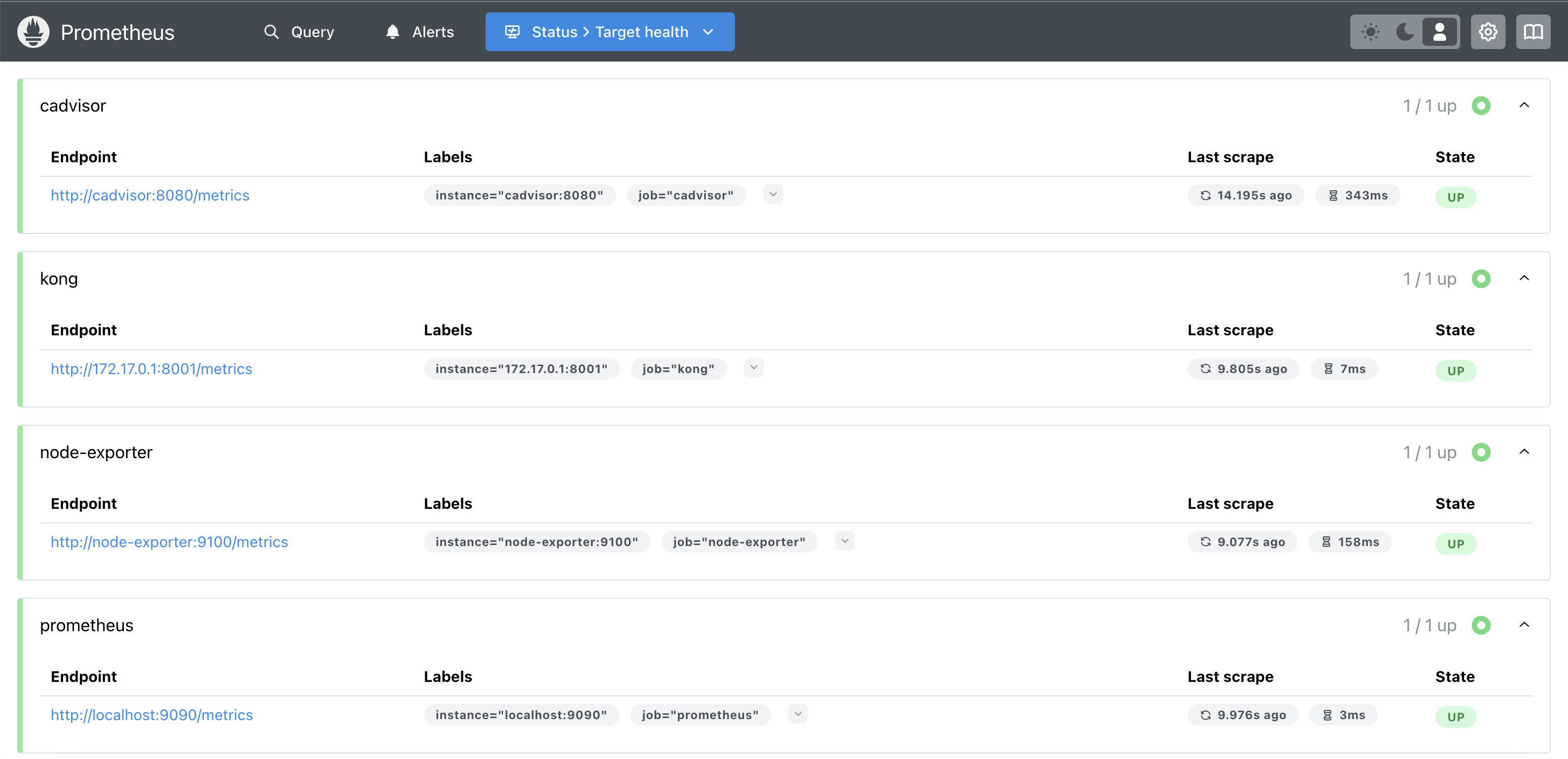
Grafana Linux Dashboard
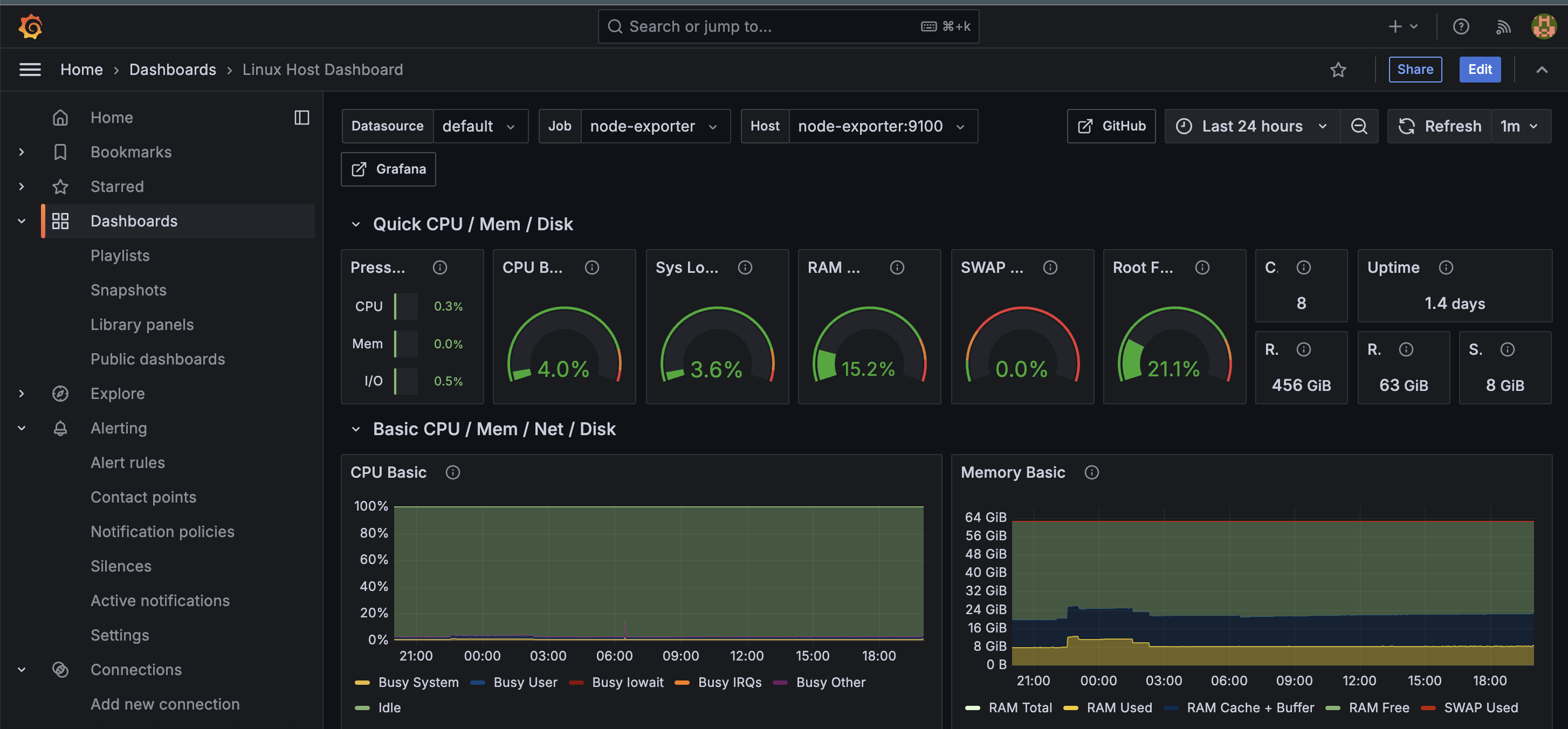
Grafana Docker Dashboard
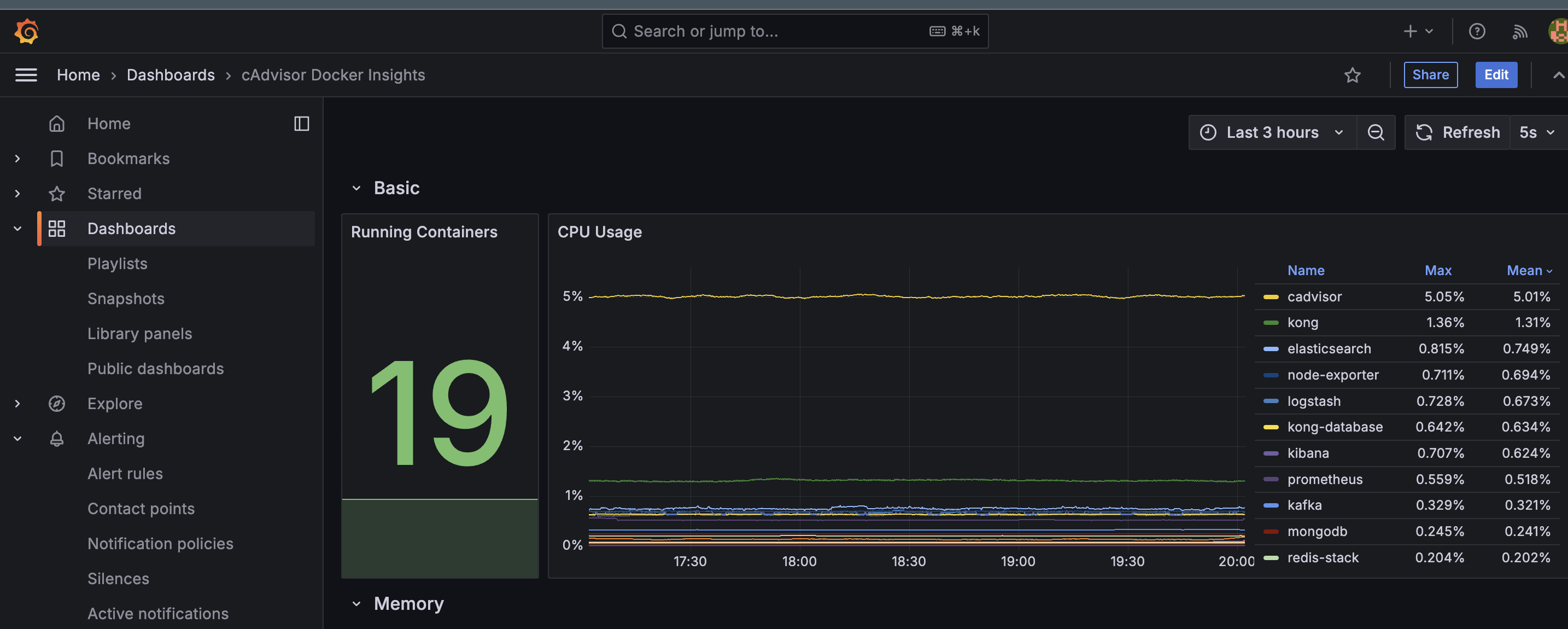
Grafana Kong Dashboard
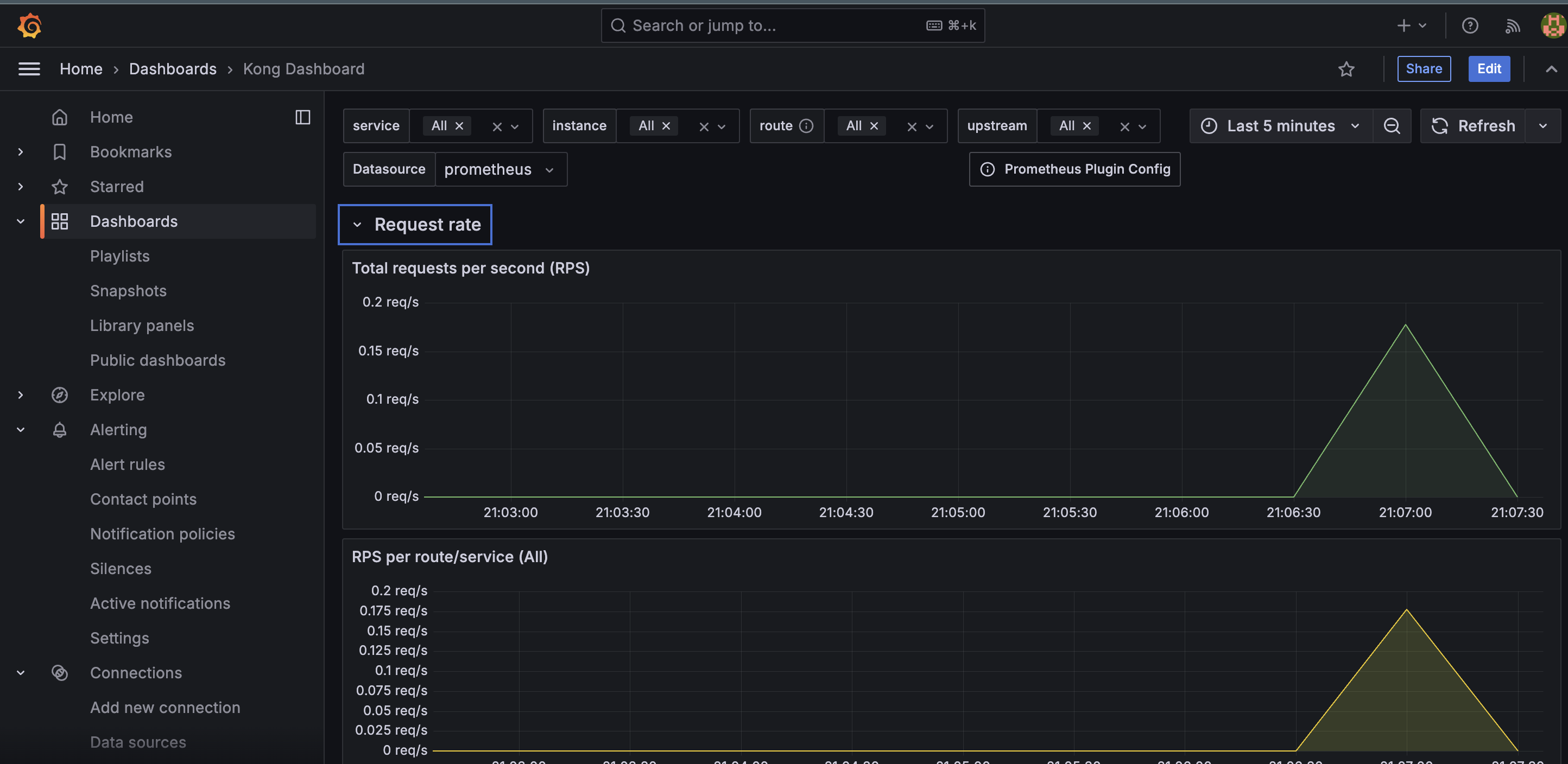
Prometheus Alert
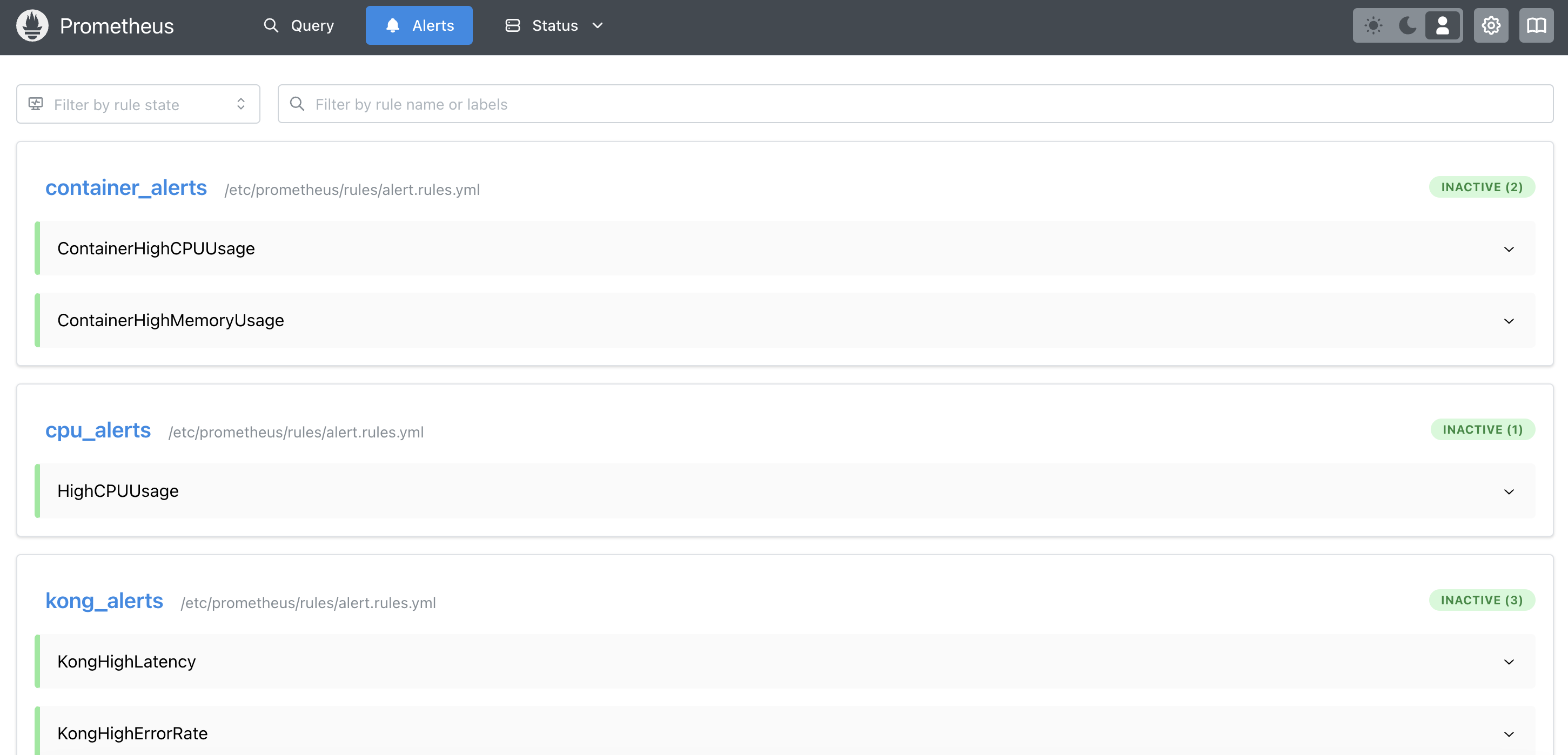
Prometheus Alertmanager
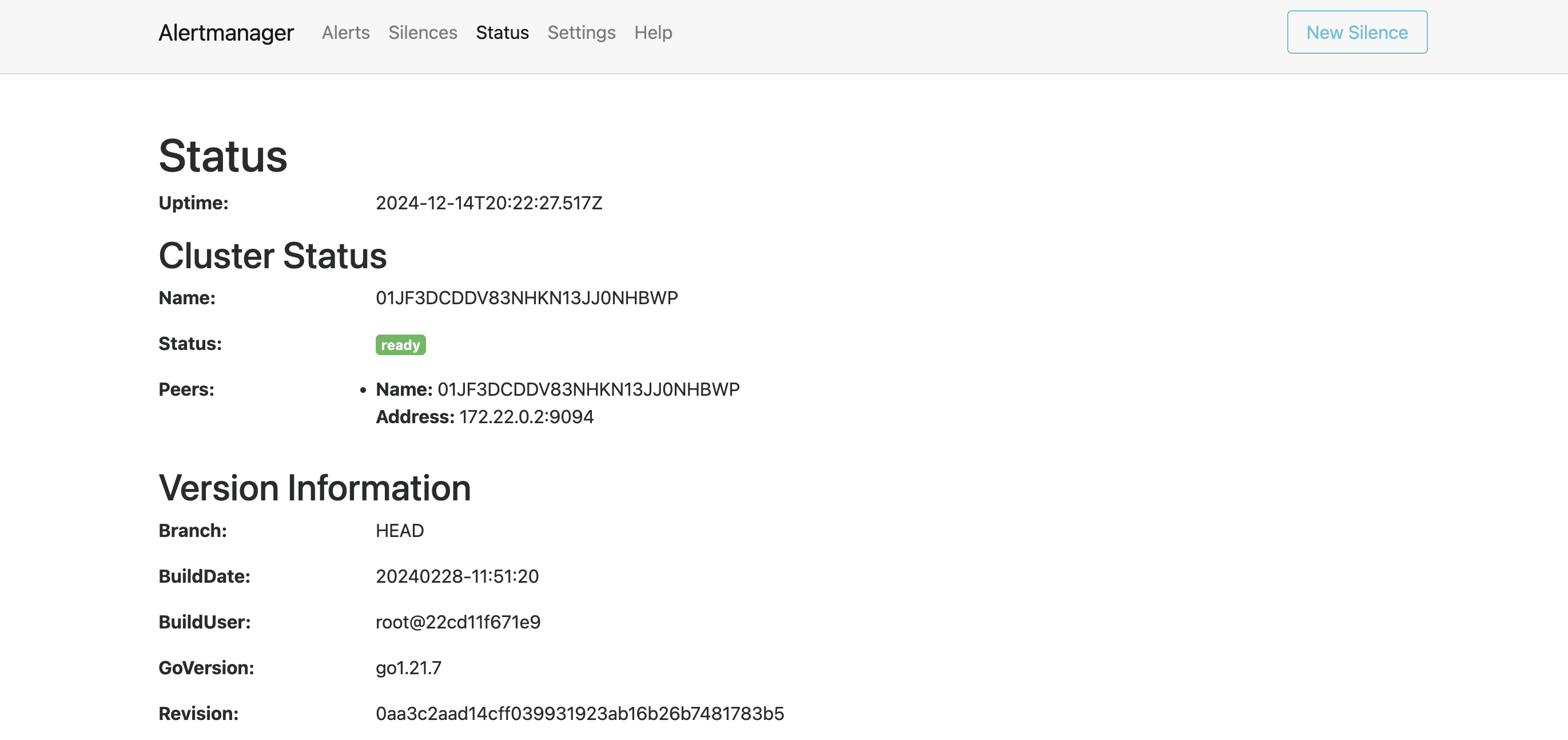
ELK Dashboard

Summary
In this example, we built a monitoring system for Docker environment using ELK and Prometheus-Grafana. We configured logging monitoring using ELK stack to monitor logs from Docker containers and metrics monitoring using Prometheus and Grafana to monitor Docker containers and linux host. We also configured alerting system using Prometheus Alertmanager to send alerts via email. Finally, we added Kong API Gateway as host entry and monitored its logs and metrics.







